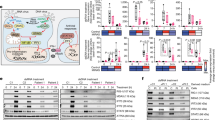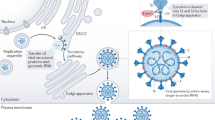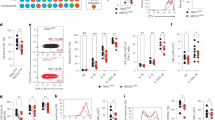Abstract
Viruses have been shown to cause bone marrow aplasia in animals1,2 and have been implicated in bone marrow failure in man3–6; however, until recently, a specific link between human viral infection and bone marrow failure has not been proven. In 1975 Cossart and colleagues found a serum parvovirus-like virus (SPLV, sometimes referred to as B19) in human serum7. Antibody to this virus is present in the sera of 30–45% of healthy adults (Y. E. Cossart, P. P. Mortimer, unpublished observations). However, evidence for a direct link came from work by Pattison et al. who found five children with transient aplastic crisis of sickle cell disease and evidence of active infection with SPLV8. This association was later confirmed in a large series of children with sickle cell disease and aplastic crisis in Jamaica9. We have studied the effects of virus-containing material on haematopoiesis, using in vitro colony-forming assays to look for direct evidence for a role of SPLV in bone marrow aplasia. We show here that SPLV-containing sera inhibit erythropoiesis in culture. Moreover, in a child with hereditary spherocytosis who developed transient aplastic crisis, a strong inhibitory effect of the patient's serum on erythropoiesis correlated with the presence of virus.
This is a preview of subscription content, access via your institution
Access options
Subscribe to this journal
Receive 51 print issues and online access
$199.00 per year
only $3.90 per issue
Buy this article
- Purchase on Springer Link
- Instant access to full article PDF
Prices may be subject to local taxes which are calculated during checkout
Similar content being viewed by others
References
Piazza, M., Piccinino, F. & Matano, F. Nature 205, 1034–1035 (1965).
Onions, D., Jarrett, O., Testa, N., Frassoni, F. & Toth, S. Nature 296, 156–158 (1982).
Young, N. Prog. Hemat. 12, 227–273 (1981).
Howie, D. L. & Crosby, W. H. Blood 18, 800–801 (1961).
Hagler, L., Pastove, R. A. & Bergin, J. J. Medicine 54, 139–164 (1975).
Shadduck, R. K. et al. Expl Hemat. 7, 264–271 (1979).
Cossart, Y. E., Field, A. M., Cant, B. & Widdows, D. Lancet i, 71–73 (1975).
Pattison, J. R. et al. Lancet i, 664–665 (1981).
Serjeant, G. R. et al. Lancet ii, 595–598 (1981).
Shneerson, J. M., Mortimer, P. P. & Vandervelde, E. M. Br. med. J. 280, 1580 (1980).
Gregory, C. J. & Eaves, A. C. Blood 49, 855–861 (1977).
Eaves, C. J., Humphries, R. K. & Eaves, A. C. Blood Cells 5, 357–387 (1979).
Lowenberg, B. & Ghio, R. Biomedicine 27, 285–289 (1977).
Freedman, M. H., Gelfand, E. W. & Saunders, E. F. Am. J. Hemat. 6, 135–141 (1979).
Siegl, G., The Parvoviruses (Springer, Vienna, 1976).
Author information
Authors and Affiliations
Rights and permissions
About this article
Cite this article
Mortimer, P., Humphries, R., Moore, J. et al. A human parvovirus-like virus inhibits haematopoietic colony formation in vitro. Nature 302, 426–429 (1983). https://doi.org/10.1038/302426a0
Received:
Accepted:
Issue Date:
DOI: https://doi.org/10.1038/302426a0
This article is cited by
-
Screening for Human Parvovirus B19 Infection in Egyptian Family Replacement Blood Donors
Indian Journal of Hematology and Blood Transfusion (2021)
-
Parvovirus B19 Infection in Human Bone Marrow Mesenchymal Stem Cells Affects Gene Expression of IL-6 and TNF-α and also Affects Hematopoietic Stem Cells Differentiation
Indian Journal of Hematology and Blood Transfusion (2019)
-
Parvovirus B19 as an etiological agent of acute pleuro-pericarditis
Bone Marrow Transplantation (2011)
-
Diamond Blackfan anaemia: apparent relapse due to B19 parvovirus
European Journal of Pediatrics (1993)
-
Different syndromes associated with B19 parvovirus viraemia in paediatric patients: Report of four cases
European Journal of Pediatrics (1992)
Comments
By submitting a comment you agree to abide by our Terms and Community Guidelines. If you find something abusive or that does not comply with our terms or guidelines please flag it as inappropriate.



